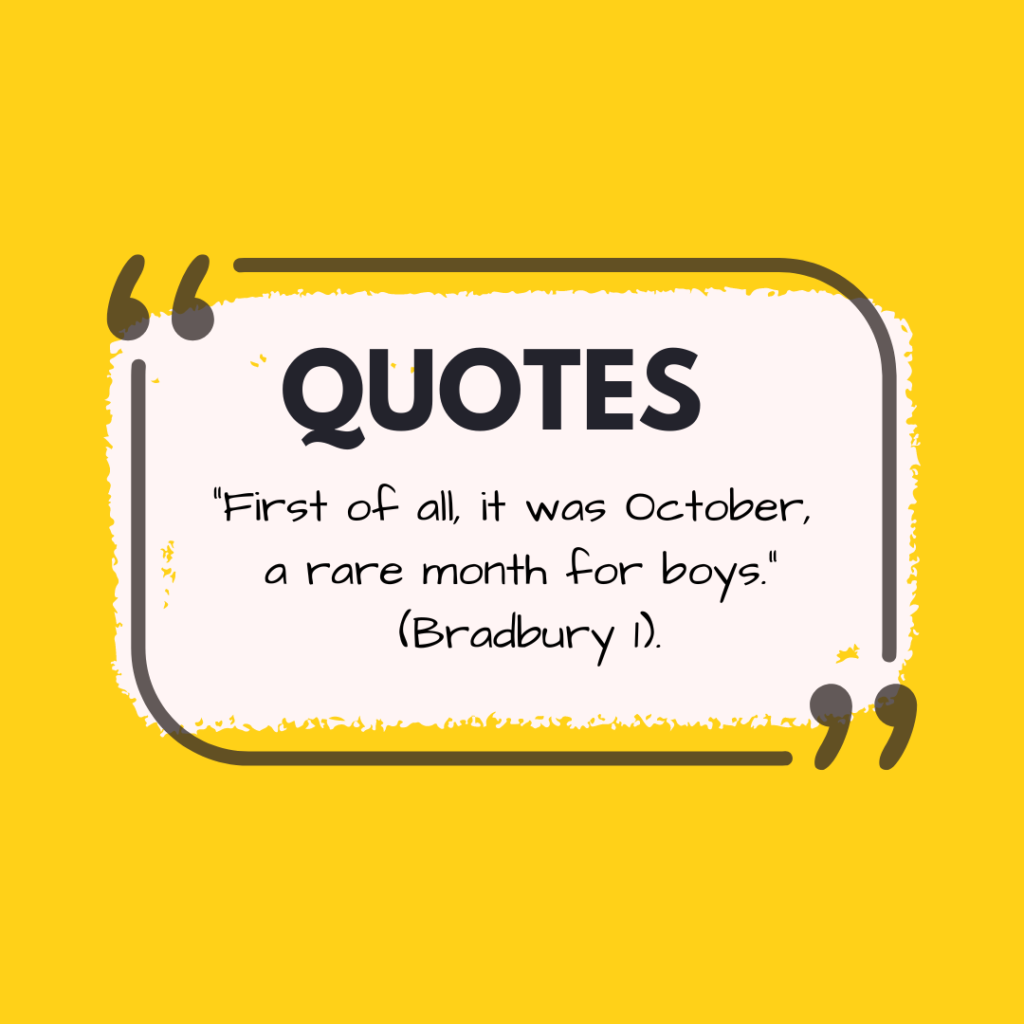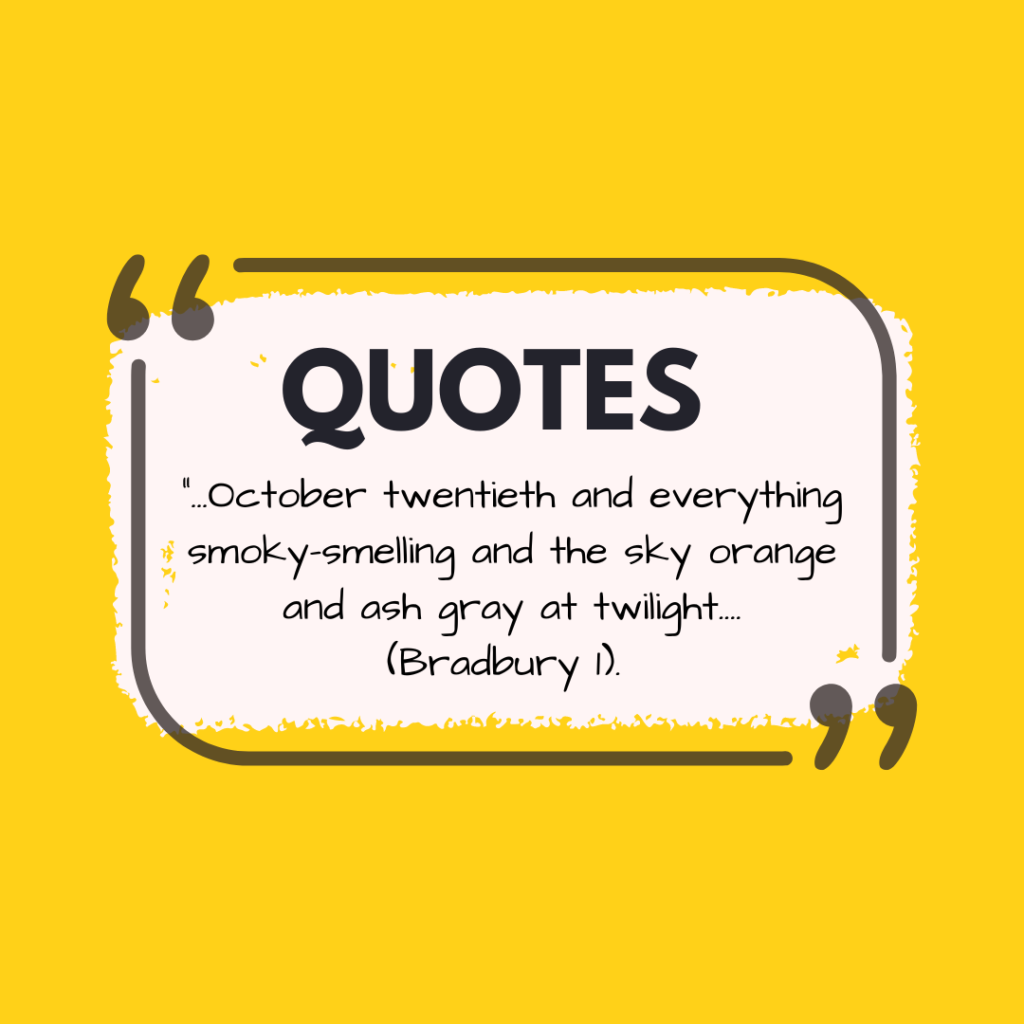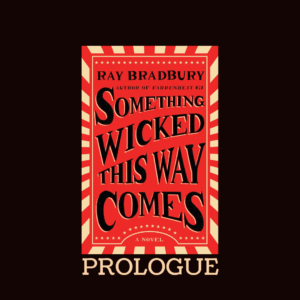Prologue
“First of all, it was October, a rare month for boys. Not that all months aren’t rare. But there be bad and good, as the pirates say. Take September, a bad month: school begins. Consider August, a good month: school hasn’t begun yet. July, well, July’s really fine: there’s no chance in the world for school. June, no doubting it, June’s best of all, for the school doors spring wide and September’s a billion years away.”(Bradbury 1).

Ray Bradbury’s writing in Something Wicked This Way Comes is a rare gem. Regardless of the genre that they write, every writer should study the way that Ray Bradbury mastered the English language and cast spells with his words.
I recommend that you join me, as I begin to annotate my own copy of Something Wicked This Way Comes.
![]()
I recommend that everyone start a book journal to track what amazes them about Something Wicked This Way Comes.

Read the Entire Prologue at the End of This Post
Work Cited
Bradbury, Ray. “Prologue.” Something Wicked This Way Comes: A Novel, Reprint, Simon and Schuster, 2017.
*****************************************************,
Because of the first lines of Something Wicked This Way Comes, I fell in love with Ray Bradbury’s writing. While Ray Bradbury also wrote Science Fiction books, he was, above all else, a great writer. Period. Anyone who has some preconceived notion that Ray Bradbury only wrote weird stuff is woefully mistaken. If you look closely at the incredible tapestry woven by this wonderful wordsmith, you will discover, as I have, that Ray Bradbury was just a guy who grew up in Illinois and who was charmed by the lore of the American midwest. By the grace of God, he had the ability to recreate the essence of that lore, and he spun it into enchantment.

Ray Bradbury was a couple of decades older than I am, and I was a child in Missouri, the state next to Bradbury’s Illinois. When I was a child, the carnival was the most spectacular thing that happened in my community. During the early autumn of every year, the carnival rolled across the farmlands and one town at a time, it beguiled the hayseeds living there. For one week only, the townspeople could take off their work gloves, rub a little oil into their dried, cracked hands, and go to the carnival, where they would spend their dusty dimes on a bit of magic.
Ray Bradbury wrote about every man, boy, and child who dared to dream in places where dreams were often drowning in sweat and choked nearly to death by the daily drudge of barely getting by. Bradbury dug deep into the hearts of the plain people and urged the weary sprites of their imaginations to dance. And he did all of that with words–mere words that he twisted and turned and juxtaposed into a mystical brew: In order to truly learn from Bradbury’s writing, I recommend that you note every one of the fabulous quotes in Something Wicked This Way Comes.

“First of all, it was October, a rare month for boys. …Take September, a bad month: school begins. Consider August, a good month: school hasn’t begun yet. July, well, July’s really fine: there’s no chance in the world for school. June, no doubting it, June’s best of all, for the school doors spring wide and September’s a billion years away.” (Bradbury 1).

I have ordered some Post-It Book Tabs from Amazon, and I plan to use one color tab to mark all my favorite quotes in Something Wicked, and I’ll use a highlighter on the exact words. I’ll use a different color tab for each of the characters, and wait until you read Bradbury’s expertise in creating characters.

In the Prologue, you will barely meet Will Halloway and Jim Nightshade.
Although Ray Bradbury did write a few sci-fi stories, he mainly wrote about kids who hated school and about average people who enjoyed an occasional tease of their imaginations. The carnival thrilled the midwesterners once a year, and for the same reasons, they also celebrated Halloween, when:
“You got time to think of the garbage you’ll dump on old man Prickett’s porch, or the hairy-ape costume you’ll wear to the YMCA the last night of the month. And if it’s around October twentieth and everything smoky-smelling and the sky orange and ash gray at twilight, it seems Halloween will never come in a fall of broomsticks and a soft flap of bedsheets around corners.” (Bradbury 1).

Every day during the month of October, I’ll share 8 to 10 pages from Bradbury’s Something Wicked, and if you don’t already know it, you will soon realize that this word charmer from Illinois was one of the best.

Prologue
“First of all, it was October, a rare month for boys. Not that all months aren’t rare. But there be bad and good, as the pirates say. Take September, a bad month: school begins. Consider August, a good month: school hasn’t begun yet. July, well, July’s really fine: there’s no chance in the world for school. June, no doubting it, June’s best of all, for the school doors spring wide and September’s a billion years away.
“But you take October, now. School’s been on a month and you’re riding easier in the reins, jogging along. You got time to think of the garbage you’ll dump on old man Prickett’s porch, or the hairy-ape costume you’ll wear to the YMCA the last night of the month. And if it’s around October twentieth and everything smoky-smelling and the sky orange and ash gray at twilight, it seems Halloween will never come in a fall of broomsticks and a soft flap of bedsheets around corners.
“But one strange wild dark long year, Halloween came early.
“One year Halloween came on October 24, three hours after midnight.
“At that time, James Nightshade of 97 Oak Street was thirteen years, eleven months, twenty-three days old. Next door, William Halloway was thirteen years, eleven months and twenty-four days old. Both touched toward fourteen; it almost trembled in their hands.” (Bradbury 1-2).

Characters Introduced in the Prologue
Will Halloway and Jim Nightshade are almost 14 years old. This age is significant. Heck, what am I saying? Everything in Something Wicked is significant. That is why the book is a masterpiece.
Will Halloway has blonde hair, and in the novel Something Wicked This Way Comes, he is the embodiment of Light.
Jim Nightshade has dark hair, and he is an embodiment of Darkness, but we will come to realize that Jim Nightshade is not the darkest character in the novel Something Wicked This Way Comes. Simplistically speaking, the cowboys riding the white ponies are good, and those on the black ponies are bad, but literature, as well as cowboys, do not lend themselves to simplistic analyses.
I’ll merely allude to this here, but at least since the time of the Ancient Greeks, mankind has been aware of degrees of darkness and light.

The Ancient Greeks called the vague, primordial, and dark emptiness Chaos.

Erebus was a more specific Darkness.

And Nyx was the type of darkness associated with Night.

But the god Hades was lampblack, an evil kind of darkness, and he ruled the underworld.
Jim Nightshade was dark, but he was night-like darkness, and he was not an absolute evil. The evil character will appear later in this story.
The names that Bradbury selects for his characters give us clues.
The word “hallow” is defined as something saintly or good.
It might surprise some to know that the holiday Halloween alludes to something saintly, as opposed to something evil. The word “Halloween” is a contraction for Hallow’s Eve. Like Christmas Eve is the Night Before Christmas, Hallow’s Eve is the Night Before All Saint’s Day. In the same way that we have gradually forgotten what Christmas is about, we have also gradually forgotten that Halloween was initially the first step toward celebrating the Saints who have come and gone.
The name Will Halloway suggests that Will was a saintly character.
The name Jim Nightshade suggests that Jim was darker than Will, but Jim is not evil.
Work Cited
Bradbury, Ray. “Prologue.” Something Wicked This Way Comes: A Novel, Reprint, Simon and Schuster, 2017.